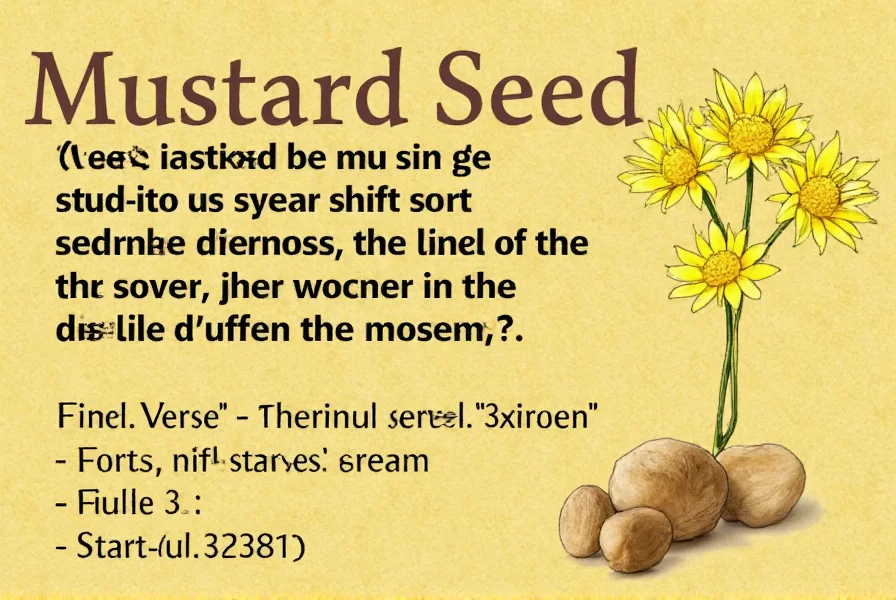When Jesus told His disciples that faith as small as a mustard seed could move mountains, He wasn't emphasizing quantity but rather the quality and authenticity of faith. This powerful metaphor appears in two Gospel accounts—Matthew 17:20 and Luke 17:6—during moments when the disciples struggled with their own spiritual limitations. The mustard seed, one of the smallest seeds in Jesus' agricultural context, represents how even the most modest yet genuine trust in God produces extraordinary results.
The Historical and Biblical Context
Understanding faith as the size of a mustard seed requires examining the circumstances when Jesus shared this teaching. In Matthew 17, the disciples had just failed to heal a boy with seizures, prompting their private question to Jesus: "Why couldn't we drive it out?" Jesus' response revealed their fundamental misunderstanding about faith's nature—not its volume but its authenticity.
The mustard plant (Brassica nigra) common in first-century Palestine grew from a tiny seed (1-2mm diameter) into a large shrub (up to 9 feet tall). This dramatic transformation made it the perfect metaphor for how seemingly insignificant faith, when genuine and God-centered, produces remarkable spiritual outcomes.
| Biblical Reference | Exact Quote | Context |
|---|---|---|
| Matthew 17:20 | "Because you have so little faith. Truly I tell you, if you have faith as small as a mustard seed, you can say to this mountain, 'Move from here to there,' and it will move. Nothing will be impossible for you." | After disciples failed to heal an epileptic boy |
| Luke 17:6 | "He replied, 'If you have faith as small as a mustard seed, you could say to this mulberry tree, 'Be uprooted and planted in the sea,' and it would obey you." | Teaching on forgiveness and servant attitude |
Debunking Common Misinterpretations
Many modern interpretations of mustard seed faith meaning miss Jesus' central point. This teaching doesn't promise that:
- Any wish can be granted with enough mental focus
- Material prosperity automatically follows small faith
- Physical healing is guaranteed regardless of circumstances
Jesus wasn't teaching a formula for manipulating spiritual forces but revealing how authentic faith in God's character and purposes creates spiritual momentum. The mountain-moving power comes not from the faith itself but from the object of that faith—God's sovereign will. This distinction separates biblical mustard seed faith from prosperity gospel distortions.
What Mustard Seed Faith Actually Looks Like
Genuine faith as small as a mustard seed demonstrates three essential characteristics:
- Authentic dependence—trusting God's character when circumstances suggest doubt
- Active obedience—faith that prompts action aligned with God's revealed will
- Unwavering focus—keeping attention on God rather than obstacles
Consider the story of the Roman centurion in Matthew 8:5-13, who demonstrated mustard seed faith by understanding Jesus' authority without demanding physical presence. His faith wasn't large in quantity but profound in quality—recognizing spiritual authority where others saw only a traveling teacher.
Practical Steps to Cultivate Mustard Seed Faith
Developing how to have faith as small as a mustard seed involves intentional spiritual practices:
1. Start with Honest Acknowledgment
Like the father in Mark 9:24 who cried, "I do believe; help me overcome my unbelief!", authentic faith begins with transparency about our spiritual condition. Admitting our faith limitations creates space for God to work.
2. Anchor in God's Character
Mustard seed faith grows when rooted in who God is rather than what we want. Study biblical names of God (Jehovah Jireh, El Shaddai) to deepen your understanding of His nature. When facing challenges, declare His attributes rather than focusing solely on the problem.
3. Take Small Obedient Steps
Like the widow who gave her two small coins (Mark 12:41-44), mustard seed faith often manifests in seemingly insignificant acts of obedience. Write down one practical step you can take this week that demonstrates trust in God's provision or guidance.

Why Size Doesn't Matter in Genuine Faith
The revolutionary aspect of Jesus' teaching was His rejection of quantitative spirituality. In a culture measuring religious devotion by visible actions (prayer length, fasting frequency, almsgiving amounts), Jesus declared that the power of faith as small as a mustard seed comes from its connection to divine power, not its volume.
Consider these modern applications:
- A single prayer offered in crisis with complete dependence
- Trusting God's provision with your last dollar
- Speaking truth when fear demands silence
These represent mustard seed faith in action—small in human terms but powerful through divine connection. The key isn't increasing faith's size but ensuring its authenticity and direction.
Deepening Your Understanding of Faith's Nature
Many seekers wonder what does faith as small as a mustard seed mean for today. The answer lies in recognizing that biblical faith isn't:
- Mental positive thinking
- Self-generated confidence
- Magical formula for wish fulfillment
True mustard seed faith involves fiducia—personal trust and reliance on God's character. It's the difference between believing in God (acknowledging His existence) and believing God (trusting His promises and character). This distinction transforms faith from abstract concept to active relationship.
When facing your personal "mountains," remember that God doesn't require perfect faith—just authentic faith. The disciples' mustard seed-sized faith eventually launched the early church. Your small but genuine trust in God's character can similarly produce extraordinary results when aligned with His purposes.
Frequently Asked Questions
What does faith as small as a mustard seed actually mean?
Faith as small as a mustard seed refers to the quality rather than quantity of faith. Jesus taught that even a tiny amount of genuine trust in God—comparable to the small size of a mustard seed—has tremendous spiritual power when aligned with God's will. The emphasis is on the authenticity and object of faith (God Himself), not the volume of faith.
Can mustard seed faith move literal mountains?
Jesus used mountain-moving as a metaphor for overcoming seemingly impossible obstacles through faith. While there are accounts of miraculous physical events in biblical and church history, the primary application is spiritual—trusting God to accomplish what's humanly impossible. The focus should remain on God's power working through authentic faith, not on demanding specific physical outcomes.
How do I develop mustard seed faith when I feel spiritually weak?
Start with honest acknowledgment of your current faith state, like the father who said "I believe; help my unbelief!" (Mark 9:24). Anchor yourself in God's character through Scripture, take small obedient steps despite fears, and surround yourself with faithful community. Mustard seed faith grows through consistent practice of trusting God in everyday circumstances, not through striving for perfect faith.
Is mustard seed faith different from positive thinking?
Yes, fundamentally. Positive thinking focuses on self-generated confidence and mental attitude, while mustard seed faith centers on trust in God's character and promises. Biblical faith involves fiducia—personal reliance on God—not merely optimistic thinking. Mustard seed faith acknowledges human limitation while depending on divine power, whereas positive thinking often emphasizes human potential.











 浙公网安备
33010002000092号
浙公网安备
33010002000092号 浙B2-20120091-4
浙B2-20120091-4